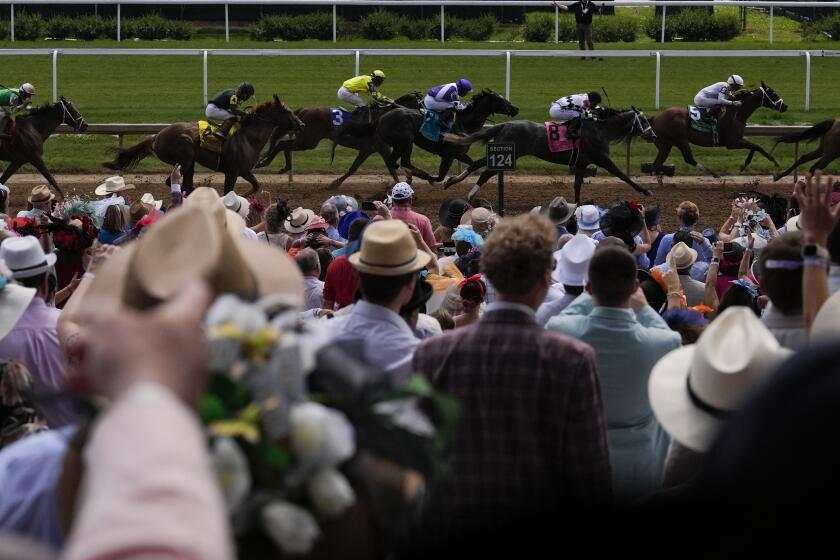Golf Starts Paying When 2 Pros Stop Playing to Manage Courses
- Share via
Golf pros Jeff Silverstein and Bob Husband dreamed of finding fame and wealth on the golf course. They found the wealth, plenty too, more than enough to keep Tom Watson in spending money. But to do it they put their golf clubs in the closet.
Today, they head CCA Silban Sports Corp. of Van Nuys, a thriving firm that manages 15 public golf courses in California. Back in the late 1970s, Husband and Silverstein were struggling pros who plunked down $10,000 and took over the pro shop at El Cariso Golf Course in Sylmar.
Last October, they sold 80% of their company for $1.32 million to Club Corp. of America, a Dallas firm with $350 million in sales that owns or operates 175 golf courses, including some splendid ones such as Firestone in Ohio and Pinehurst in North Carolina.
Silverstein, 33, and Husband, 36, are hardly ready to retire. Armed with long-term employment contracts and performance incentives, they could double the $1.32 million in three years.
Their story could serve as a parable of how to succeed in business in the 1980s: take on a mountain of debt, stretch out the cash flow and work hard. Last year their business did $4 million in sales.
Have Financial Muscle
By teaming up with CCA, Silverstein and Husband now have the financial muscle to take aim on the leader in public golf course management, American Golf, based in Los Angeles, a $100-million company that owns or operates 90 golf courses.
Said American Golf’s president, Bob Williams: “I’m not too concerned to have a small division just starting out that’s competing in public golf.”
“We’re going to go after them,” countered Silverstein. “There’s so much opportunity in this business.”
The opportunity comes from “privatization,” as local governments are under pressure to be more efficient. Often, aging municipal golf courses are losing money. So cities increasingly turn over their courses to firms such as Silban that agree, on long-term leases, to do everything--manning the pro shop, mowing the greens and flipping hamburgers.
In the late 1970s, for example, Los Angeles County was losing $1.3 million a year on its 18 golf courses. Today, with 13 of the county’s courses let out on master leases, the county enjoys a positive $2.5-million cash flow.
“We do a lot better economically with the private sector,” said Ralph Cryder, county director of parks and recreation. “Their wage rates are lower. They can hire and fire at will, maneuver quicker.”
‘Full of Energy and Ideas’
Husband and Silverstein have contracts for various concessions at four county golf courses. “They are full of energy and great ideas,” Cryder said.
Husband had a great idea back in 1978, but it had nothing to do with business. He was a hungry assistant pro who like thousands of others yearned to tee it up on the PGA tour. Joe Hamilton, a TV producer and Carol Burnett’s ex-husband, grubstaked him for a run on the Arizona mini-tour, the golfing equivalent of the minor leagues. But Husband wanted to try the PGA tour.
At the time, a PGA head pro from a golf club could declare himself a member of the pro tour without fighting his way through the qualifying school. So Husband bid on the concession at the El Cariso Golf Club, not to rent carts and peddle golf balls, but “as a way to get on the tour.”
The next year Silverstein bought half of Husband’s concession for $5,000. Both planned to work the pro shop in the winter and, in the summer, try to become the next Jack Nicklaus, or even the next Rex Caldwell, who played at California State University, Northridge and enjoyed modest success on the tour.
Played Down Under
Silverstein, who grew up in the San Fernando Valley, spent a winter playing on the Australian and New Zealand circuit. “I put together my first limited partnership,” he recalled with a laugh. A dozen friends put up $6,000 to finance his three-month trip Down Under, but it was a bust. He only earned $1,200.
Husband and Silverstein did play in a handful of PGA events: Silverstein in the L.A. Open, Husband in the Quad Cities Open, and both entered the Buick Open.
The results, said Silverstein, who at 5 feet 9 inches and 125 pounds is built like a 1 iron, weren’t encouraging. “It was obvious, based on the mini-tour and traveling around, that we weren’t going to be able to make a living on the tour. So we started concentrating on building our business.”
From the first day, they managed their business like Arnold Palmer played golf--adventurously. “We totally leveraged ourselves. We had no money. We’d take $200 a week in salary and give 45 golf lessons a week. We leased carts, we bought inventory, and we stretched people out. If bills were due in 90 days, we paid in 120 days. We changed vendors. We did everything we could. We had no houses, nothing to collateralize,” Silverstein said.
In 1983 they bid on two courses in San Francisco, the Harding Park and Lincoln Park golf courses. Not expecting to win--pro golfer Lee Elder’s group was bidding on the Harding course--Silverstein and Husband promised to make $250,000 in capital improvements (or $250,000 more than they had) at the two clubs.
But win they did. With the help of an attorney they raised the cash in 10 days through a limited partnership.
Whatever skills the pair lacked as touring pros, they possess as merchants. “The most important thing on a golf course is the first impression,” Husband said. Silban repaints golf shops, puts in new carpeting, keeps up the putting greens, and brings in a fleet of new golf carts--making it more likely that golfers will rent them.
The average income of a public links player is $37,000 a year, Husband said. “They are used to public courses not being so nice. And so, when you do give them something nice, they react very positively.”
Silban also loads up on golf equipment and tries to move it out of the pro shop by matching or beating sales prices of discount shops. To motivate the staff, the company pays assistant pros only $5 an hour, but the pros can make $30 an hour giving lessons, plus commissions on sales of major golf equipment.
Hawking golf balls and collecting greens fees might sound like a nickel-and-dime business. On a good public course with 100,000 rounds played a year, however, it quickly adds up.
At the 36-hole Sepulveda Basin golf complex in Encino last year, Silverstein and Husband took in $660,000 from the pro shop and driving range, up from $270,000 in 1981.
Next door at the Woodley Lakes Golf Course in Van Nuys, Silban expects to do $175,000 in sales just from the driving range this year, up from $25,000 a year ago when it was a bare dirt field. Now players can hit off real grass instead of rubber mats.
Most of Silban’s deals thus far have been piecemeal, managing a pro shop or a driving range but not running the whole show. With CCA’s financial backing, the company is now bidding for master leases in which it will be responsible for every blade of grass.
The pros expect to double sales to $8 million this year. The company has added four golf courses recently, including a 15-year master lease deal at the Diamond Bar Golf Course, owned by Los Angeles County. They also plan to bid on courses in Nevada, Arizona and maybe Texas.
Silverstein has only one gripe. He has played only one round of golf in the last five months. “When you work, you can’t play,” he said.
More to Read
Go beyond the scoreboard
Get the latest on L.A.'s teams in the daily Sports Report newsletter.
You may occasionally receive promotional content from the Los Angeles Times.











